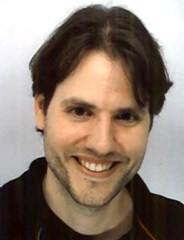 Elmar Eisemann is a professor at TU Delft, heading the Computer Graphics and Visualization Group. Before he was an associated professor at Telecom ParisTech (until 2012) and a senior scientist heading a research group in the Cluster of Excellence (Saarland University / MPI Informatik) (until 2009). He studied at the École Normale Supérieure in Paris (2001-2005) and received his PhD from the University of Grenoble at INRIA Rhône-Alpes (2005-2008). He spent several research visits abroad; at the Massachusetts Institute of Technology (2003), University of Illinois Urbana-Champaign (2006), Adobe Systems Inc. (2007,2008). His interests include real-time and perceptual rendering, alternative representations, shadow algorithms, global illumination, and GPU acceleration techniques. He coauthored the book “Real-time shadows” and participated in various committees and editorial boards. He was local organizer of EGSR 2010, 2012, HPG 2012, and is paper chair of HPG 2015. His work received several distinction awards and he was honored with the Eurographics Young Researcher Award 2011. His talk will take place on Friday, May 20th, 2016, 2pm in room E105.
Elmar Eisemann is a professor at TU Delft, heading the Computer Graphics and Visualization Group. Before he was an associated professor at Telecom ParisTech (until 2012) and a senior scientist heading a research group in the Cluster of Excellence (Saarland University / MPI Informatik) (until 2009). He studied at the École Normale Supérieure in Paris (2001-2005) and received his PhD from the University of Grenoble at INRIA Rhône-Alpes (2005-2008). He spent several research visits abroad; at the Massachusetts Institute of Technology (2003), University of Illinois Urbana-Champaign (2006), Adobe Systems Inc. (2007,2008). His interests include real-time and perceptual rendering, alternative representations, shadow algorithms, global illumination, and GPU acceleration techniques. He coauthored the book “Real-time shadows” and participated in various committees and editorial boards. He was local organizer of EGSR 2010, 2012, HPG 2012, and is paper chair of HPG 2015. His work received several distinction awards and he was honored with the Eurographics Young Researcher Award 2011. His talk will take place on Friday, May 20th, 2016, 2pm in room E105.
Everything Counts – Rendering Highly-detailed Environments in Real-time
A traditional challenge in computer graphics is the simulation of natural scenes, including complex geometric models and a realistic reproduction of physical phenomena, requiring novel theoretical insights, appropriate algorithms, and well-designed data structures. In particular, there is a need for efficient image-synthesis solutions, which is fueled by the development of modern display devices, which support 3D stereo, have high resolution and refresh rates, and deep color palettes.
In this talk, we will present methods for efficient image synthesis to address recent rendering challenges. In particular, we will focus on large-scale data sets and present novel techniques to encode highly detailed geometric information in a compact representation. Further, we will give an outlook on rendering techniques for modern display devices, as these often require very differing solutions. In particular, human perception starts to paly an increasing role and has high potential to be a key factor in future rendering solutions.